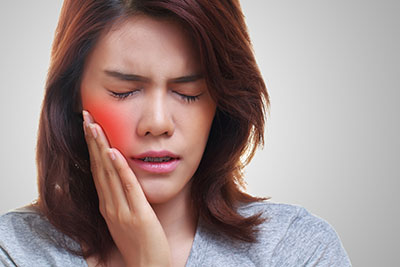With dental offices being closed due to the COVID-19 pandemic, it may be difficult to receive immediate dental treatment, especially if it is not considered a dental emergency.
According to the Ontario Dental Association, a dental emergency is:
- A severe injury to the teeth, mouth, and/or face
- Severe infection, like an abscess or swelling
- Bleeding that doesn't stop
- Dental pain that cannot be managed with over-the-counter painkillers
If you are suffering, but not with the symptoms stated above, here are a few home remedies you can try to relieve discomfort.
- Saltwater Rinse
If your tooth hurts and/or you have swollen gums, dissolve a teaspoon of salt in a cup of warm water to use it as a pain-killing mouthwash. Swish for about 30 seconds before spitting out. This helps to clean away debris in your mouth. The salt also helps with reducing swelling in gum tissue. While both hot and cold water might feel uncomfortable when you have a toothache, warm water is soothing and helps relieve the pain.
- Cold Compress
If you have swollen gums and/or face, especially associated with trauma, you can use a cold compress to temporarily relieve pain. Wrap a cold pack or a bag of ice in a towel and hold it on the affected area for 20 minutes. You can repeat this every few hours. The cold helps numb the area, which helps to reduce inflammation and relieve pain.
- Clove Oil
Clove oil has been used for decades as a traditional and natural pain-numbing remedy. Dab a small amount of clove oil on a cotton ball and apply to the affected area until the pain recedes. The primary chemical compound in cloves is eugenol, which is a natural anesthetic and helps to numb the pain. However, be careful when using clove oil and only use it on the affected area. If you are unable to find clove oil, powdered clove or a whole clove can also be used on the affected area. Make sure to chew the whole clove a little bit to release its oil.
- Peppermint Tea
Brew a teabag of peppermint tea in a cup of boiling water. Let the tea and teabag cool down separately until it is warm enough. Use the tea to rinse your mouth by swishing it for 30 seconds. Use the teabag as a compress on the affected area. The peppermint also has similar numbing properties as cloves, so it helps in alleviating the pain.
If your symptoms last for more than a couple of days or continue to worsen, call us so we can try to help you and guide you for the optimal next steps.
How to Avoid a Dental Emergency
Taking good care of your oral health is the first step to avoid any dental emergency. This involves:
- Brushing your teeth twice a day
- Flossing regularly
- Drinking plenty of water
- Consuming less sweets and alcohol with meals and brushing your teeth right after
- Avoiding hard candy
- Using your teeth only for eating (not for snapping off plastic tags from your clothes or to rip open plastic packages) - using your teeth for such activities can chip or break them


